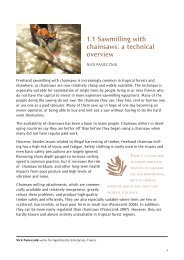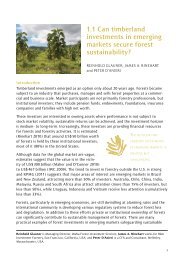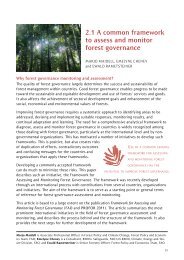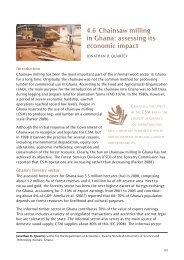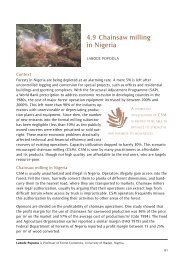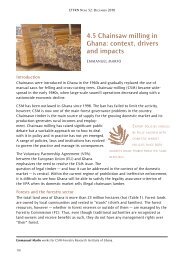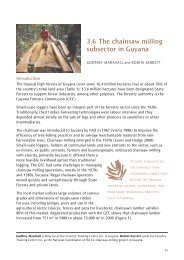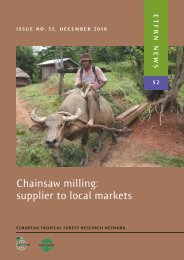Chainsaw milling: supplier to local markets - European Tropical ...
Chainsaw milling: supplier to local markets - European Tropical ...
Chainsaw milling: supplier to local markets - European Tropical ...
Create successful ePaper yourself
Turn your PDF publications into a flip-book with our unique Google optimized e-Paper software.
160<br />
ETFRN NEws 52: DEcEmbER 2010<br />
had a comparable turnover in monetary returns as the formal sec<strong>to</strong>r in 2007, although it<br />
supplied only the domestic <strong>markets</strong> (birikorang et al. 2008). birikorang (2007) estimates<br />
that, based on financial and economic return assessments, the informal sec<strong>to</strong>r makes a<br />
more significant contribution <strong>to</strong> employment than the formal sec<strong>to</strong>r.<br />
Ghana is exporting less timber <strong>to</strong> Europe, partly because of <strong>European</strong> union (Eu) requirements<br />
regarding the source and legality of timber. The shortage of timber has resulted<br />
in some fac<strong>to</strong>ries shutting down in Ghana. The regional market (west africa) is growing<br />
in importance, however; the sahel region is a prominent destination for timber, mainly<br />
illegal. Trade in illegal timber is on the increase, compared <strong>to</strong> trade in legal timber. The EC<br />
(2008) indicates that the informal sec<strong>to</strong>r is responsible for<br />
about 52% of the largely illegal timber trade in Ghana.<br />
in the formal sec<strong>to</strong>r, about 19% of timber comes from<br />
illegal sources. This shows that about 71% of the annual log<br />
volume could be illegal. a study by the EC (2008) indicates<br />
that it is easy <strong>to</strong> obtain documents <strong>to</strong> authorize illegal logs<br />
in Ghana.<br />
illegal timber harvesting reached 1.7 million m 3 in 2008,<br />
supplying about 40% of the formal industry needs and more<br />
than 80% of the informal (mainly domestic) sec<strong>to</strong>r needs<br />
(birikorang et al. 2008). The processing capacity of the <strong>milling</strong> industry was seven million<br />
m 3 at that time, concentrated in ten companies found mainly in kumasi and Takoradi.<br />
institutional and legal framework<br />
Ghana’s forestry policy has established a legal and institutional framework for operations<br />
in the sec<strong>to</strong>r. The harvest of trees and control of timber movements in Ghana leaves much<br />
<strong>to</strong> be desired, however. FsD is responsible for checking of harvests at the stump site, but<br />
frequently fails <strong>to</strong> do so. in many cases, checks of timber in transit by the Timber industry<br />
Development Division (TiDD) are a mere formality due <strong>to</strong> corruption. This allows illegal<br />
timber <strong>to</strong> be a part of the economy.<br />
bans on exporting logs have been a recurring feature of Ghana’s timber industry. Two<br />
such bans were instituted in 1979 and 1988. The international institute for Environment<br />
and Development (iiED) observed that these bans might have been more effective if they<br />
had been accompanied by appropriate supply-side measures such as felling controls (iiED<br />
1993). The log export ban imposed in 1995 was followed by a <strong>to</strong>tal ban on Csm.<br />
chainsaw <strong>milling</strong> in Ghana<br />
The <strong>local</strong> wood market in Ghana, unlike the export market, has not been given enough<br />
official attention. Formal sec<strong>to</strong>r firms (sawmills) are required <strong>to</strong> supply the <strong>local</strong> market<br />
with 20% of their output by law, although many do not comply. Even when they do, the<br />
supplies were usually <strong>to</strong>o expensive, <strong>to</strong>ok <strong>to</strong>o long <strong>to</strong> arrive or were processed according<br />
<strong>to</strong> export specifications and did not suit the needs of <strong>local</strong> consumers. This dis<strong>to</strong>rted the<br />
domestic market, which had <strong>to</strong> satisfy this demand. Csm helped fill the gap created by the<br />
inadequate supply of lumber.



